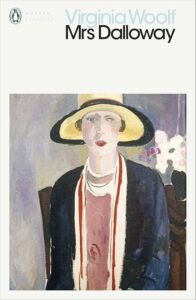For most of my time reading Mrs Dalloway, I wrestled with the eight deadly words: I don’t care what happens to those people. The novel begins with a relatively famous opening line, “Mrs Dalloway said she would buy the flowers herself.” It tells stories of numerous people on one day in midsummer London of 1923, interspersed with their memories from many different periods of their lives. Woolf uses a stream of consciousness technique to chronicle what happens to the characters, along with their reactions, their states of mind, and the associations that objects or events bring to mind. Her approach was a considerable formal innovation when the book was published in 1925. Woolf’s close observation broke ground in terms of storytelling and in the topics that novels saw fit to address.
Clarissa Dalloway is an upper-crust Englishwoman determined to throw a good party on the night of the day when the book is set. Her husband Richard works in the government, won’t make it into the Cabinet, and at lunchtime helps an establishment lady write a letter to The Times with a public-spirited suggestion, or at least what Lady Bruton thinks is public spirited. Naturally, it is about what other people should do to advance her notions. Peter Walsh surprises Clarissa with an unannounced visit at a scandalously early hour. He has returned from India, hoping to engage lawyers to get his latest love a divorce, hoping also that his friends, such as Richard Dalloway, can get him a job appropriate to his station and interests. Peter had been in love with Clarissa when they were young adults, and she had rather returned the sentiments, but she had also spurned his offer of marriage in favor of the more solid and ambitious Richard.
If this is all starting to sound a bit like a soap opera, that’s because it is, and among people for whom the word “enervated” was coined. Some of the secondary characters are more amusing portraits; others are just mean, like the spiteful Miss Kilman (although she has a soft spot for the Dalloways’ daughter Elizabeth) or the pompous Hugh Whitbread. There is a parallel story that follows Septimus Warren Smith, a WWI veteran from much further down in the social hierarchy than the Dalloways. He is suffering from shell shock, and from the loss of Evans, his closest friend from his army unit. Just how intimate this friendship became is left unstated, but visions of Evans haunt Smith, who has gradually become estranged from his devoted but puzzled Italian war bride, Lucrezia (called Rezia in most of the text). Septimus is losing his grip entirely, and treatments — or at least visitations — from various doctors are no help. One of the doctors is invited to Clarissa’s party, and one or two others observe Rezia or Septimus at different points during the day, thus linking the novel’s two strands.
The stream of consciousness narration is a dazzling technical achievement. I don’t want to underestimate the difficulty of moving among so many characters’ consciousnesses with such felicity, or Woolf’s craft in capturing the fleeting moments, the random bits, the oscillating moods that pass through someone’s — several someones’ in this case — minds over the course of a day. I can clearly see why the editors of the Süddeutsche Zeitung chose Mrs Dalloway to be part of their second set of great novels of the 20th century. I can also imagine that the types and concerns of the people Woolf portrayed were more interesting to an English audience 100 years ago than they are to a reader in 2020s Berlin. But in fact, I did not care what happened to those people, and I only finished the book for two reasons, neither of which casts me in a warm light.
First, the book is short. Second, about a third of the way through I thought of an alternative opening sentence, and that led me to picture a parody of Mrs Dalloway, a much more louche, decadent and silly book. “Mrs Dalloway said she would buy the weed herself.” Now that could have been a lot of fun.


1 pings
[…] 52. Orhan Pamuk: My Name Is Red 53. Margriet de Moor: The Virtuoso 54. Virginia Woolf: Mrs Dalloway 55. Ingo Schulze: 33 Augenblicke des Glücks (33 Moments of Happiness) 56. Louis Begley: Wartime […]